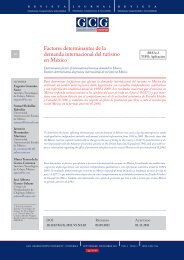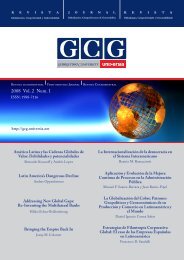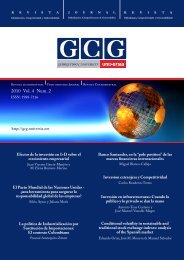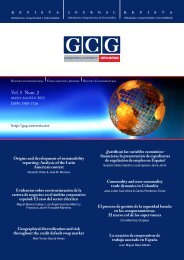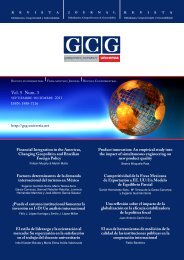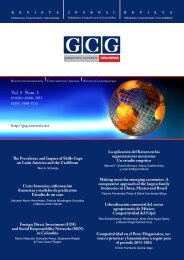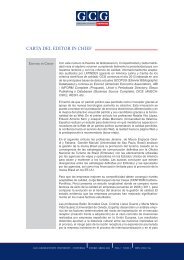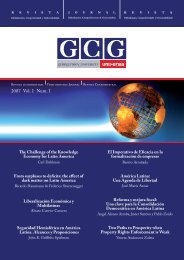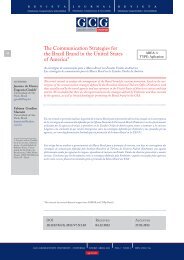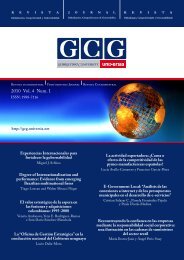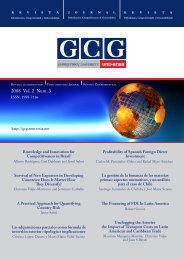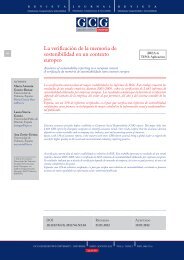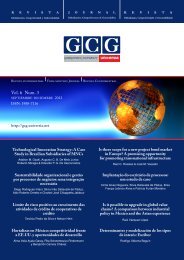Vol. 6 Num. 1 - GCG: Revista de Globalización, Competitividad y ...
Vol. 6 Num. 1 - GCG: Revista de Globalización, Competitividad y ...
Vol. 6 Num. 1 - GCG: Revista de Globalización, Competitividad y ...
Create successful ePaper yourself
Turn your PDF publications into a flip-book with our unique Google optimized e-Paper software.
Japanese Foreign Direct Investment in Mexico and the Impact of the Global Crisis50is the automobile and automobile parts industries 7 . In fact, the announcement of newinvestment plans by Japanese companies in Mexico fell to an average of $80 million in 2008and 2009 from an annual average of $1,142 million in the three previous years (Table 5).According to data gathered by the author, ten Japanese TNs operating in Mexicoannounced in the first three quarters of 2009 measures that contemplated a downwardshift in their investment expenditures as part of their global strategy. Three of themconsi<strong>de</strong>red postponement of their investment plans, three <strong>de</strong>ci<strong>de</strong>d to close some of theirplants in Mexico, three more chose to temporary shut down production, and one sold its TVassembling plant to a Taiwanese company.However, a less discouraging panorama emerged in 2010. Announcements of new investmentplans by Japanese enterprises have shown up again. So far the US rescue plans, especiallysubsidies to automobile consumption, have had a positive impact on Mexican exports,increasing their volume 52%; Japanese exports of cars from Mexico increased by 44%(Table 4). Of course, continued investment flows will <strong>de</strong>pend on the recovery of the Mexicanexport sector, which in turn <strong>de</strong>pends on the US economy. This ten<strong>de</strong>ncy will be reinforcedby the impact that the US crisis has on the Japanese FDI in that country, due to the closeconnection between the Japanese subsidiaries established in the US and the Japanese FDIin Mexico. Moreover, the expected impact of the US rescue plans on the <strong>de</strong>velopment ofautomobile products with greater energy efficiency can benefit the Japanese automakersthat already have an advantage in these types of products. This could be an opportunity forMexico, since it already has a competitive automobile sector.7. EpilogueThe recent events in Japan, triggered by the earthquake and tsunami of March 2011,have pointed out the global relevance of Japanese firms as suppliers of parts and componentsfor global production networks, given the fragmentation of production in differentlocalities. Almost every global enterprise has been impacted by this situation, andin the short run they have respon<strong>de</strong>d by adjusting their targets of production. This hasbeen the case with many firms operating in Mexico, especially in the electronic and theautomobile industries. In the long run, Mexico can benefit from this situation as Japaneseinput suppliers located in the Tohoku region, which was the most affected, seekto recuperate their production levels by displacing their plants to other geographic locations.Since Mexico already has a consolidated group of Japanese manufacturers establishedin the country, they can stimulate some of their partners to move to Mexico.7. El Universal, “Se ‘paralizan’ nuevas inversiones <strong>de</strong> Japón”, 12 April 2009.<strong>GCG</strong> GEORGETOWN UNIVERSITY - UNIVERSIA ENERO-ABRIL 2012 VOL. 6 NUM. 1 ISSN: 1988-7116pp: 36-54



